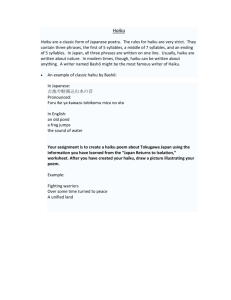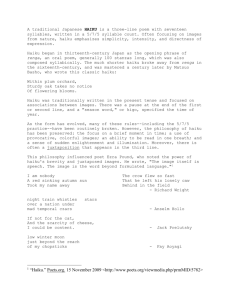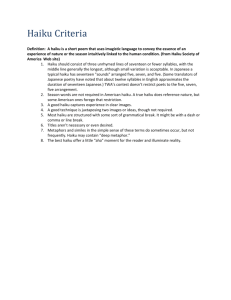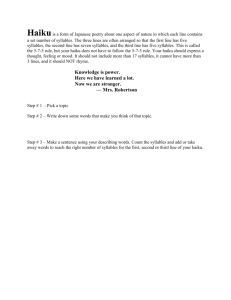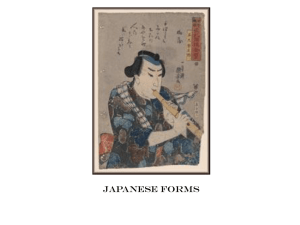play with the words like sculpting with clay
advertisement
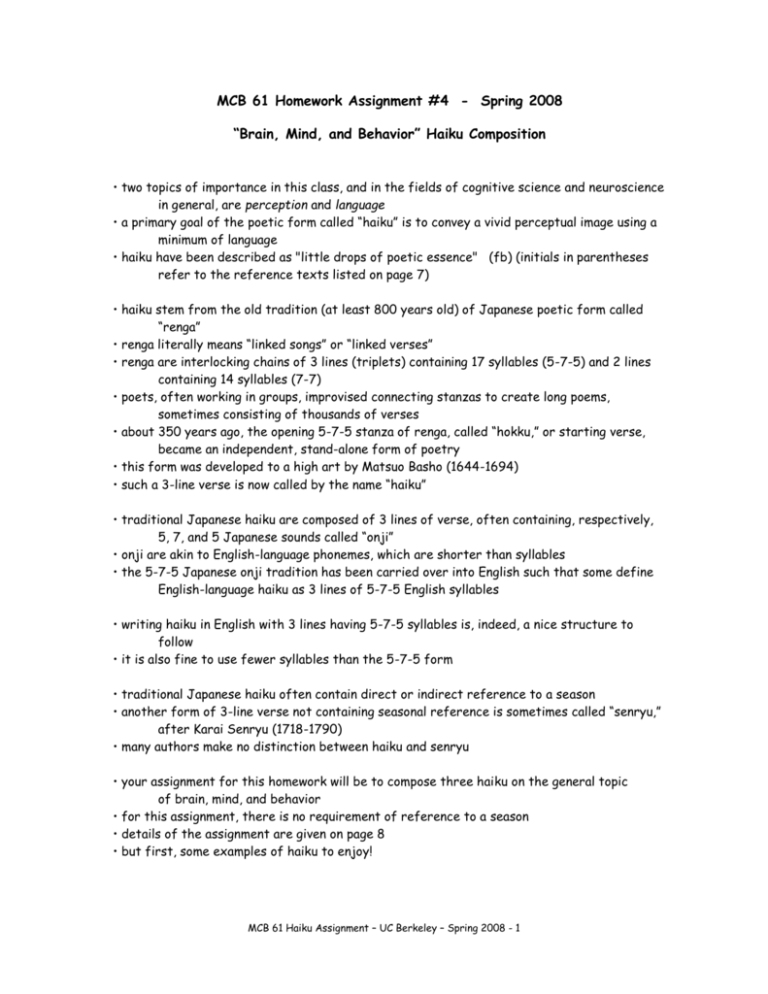
MCB 61 Homework Assignment #4 - Spring 2008 “Brain, Mind, and Behavior” Haiku Composition • two topics of importance in this class, and in the fields of cognitive science and neuroscience in general, are perception and language • a primary goal of the poetic form called “haiku” is to convey a vivid perceptual image using a minimum of language • haiku have been described as "little drops of poetic essence" (fb) (initials in parentheses refer to the reference texts listed on page 7) • haiku stem from the old tradition (at least 800 years old) of Japanese poetic form called “renga” • renga literally means “linked songs” or “linked verses” • renga are interlocking chains of 3 lines (triplets) containing 17 syllables (5-7-5) and 2 lines containing 14 syllables (7-7) • poets, often working in groups, improvised connecting stanzas to create long poems, sometimes consisting of thousands of verses • about 350 years ago, the opening 5-7-5 stanza of renga, called “hokku,” or starting verse, became an independent, stand-alone form of poetry • this form was developed to a high art by Matsuo Basho (1644-1694) • such a 3-line verse is now called by the name “haiku” • traditional Japanese haiku are composed of 3 lines of verse, often containing, respectively, 5, 7, and 5 Japanese sounds called “onji” • onji are akin to English-language phonemes, which are shorter than syllables • the 5-7-5 Japanese onji tradition has been carried over into English such that some define English-language haiku as 3 lines of 5-7-5 English syllables • writing haiku in English with 3 lines having 5-7-5 syllables is, indeed, a nice structure to follow • it is also fine to use fewer syllables than the 5-7-5 form • traditional Japanese haiku often contain direct or indirect reference to a season • another form of 3-line verse not containing seasonal reference is sometimes called “senryu,” after Karai Senryu (1718-1790) • many authors make no distinction between haiku and senryu • your assignment for this homework will be to compose three haiku on the general topic of brain, mind, and behavior • for this assignment, there is no requirement of reference to a season • details of the assignment are given on page 8 • but first, some examples of haiku to enjoy! MCB 61 Haiku Assignment – UC Berkeley – Spring 2008 - 1 • below are examples of haiku (and some senryu, if you wish to make that distinction) to guide you in your poetic composition • English translations of Japanese haiku composed by the great master Matsuo Basho (1644-1694) old pond a frog leaps in, water's sound (wh) • Japanese original for the above English translation • illustrating the 5-7-5 pattern of Japanese onji syllables furuike ya kawazu tobikomu mizu no oto • this is one of the best known poems in the Japanese language This road – no one goes down it, autumn evening. (rh) The crane's legs have gotten shorter in the spring rain. (rh) First day of spring – I keep thinking about the end of autumn. (rh) A bee staggers out of the peony. (rh) It's not like anything they compare it to – the summer moon. (rh) How admirable! to see lightning and not think life is fleeting. (rh) oh, nothing's happened to me! yesterday has passed – fugu soup (mu) MCB 61 Haiku Assignment – UC Berkeley – Spring 2008 - 2 clouds now and then give rest to people viewing the moon (mu) the first snow just enough to bend the daffodil leaves (mu) so exciting and, after a while, so sad – cormorant fishing (mu) • note on cormorant fishing: a unique method used to catch fish in the Nagara River of Japan, employed since ancient times. Fishermen aboard boats manipulate cormorants using leashes, inducing them to catch trout, which they are then forced to regurgitate. The best poetry is out in the country – farmers singing rice-planting songs. (rs) In the cool of autumn some peel eggplant, some cucumber. (rs) Now that the damn cat has stopped yowling, I can see moonlight in my bedroom. (rs) If you have no rice to give, put a flower in the jar. (rs) Such fragrance from where, which tree? (ls) the roadside thistle, eager to see the travelers pass, was eaten by the passing ass! (fb) • Japanese original for the above English translation michinobe no mukuge wa uma ni kuware keri MCB 61 Haiku Assignment – UC Berkeley – Spring 2008 - 3 • English translations of Japanese haiku composed by Yosa Buson (1716-1783) Coolness – the sound of the bell as it leaves the bell. (rh) Sparrow singing – its tiny mouth open. (rh) They end their flight one by one – crows at dusk. (rh) It’s a temple! this grove of trees and falling blossoms. (rs) A line of calligraphy: wild geese above the foothills – and a red moon for the seal. (rs) • English translations of Japanese haiku composed by Kobayashi Issa (1763-1827) Don't worry, spiders, I keep house casually. (rh) Children imitating cormorants are even more wonderful than cormorants. (rh) The first sign of a thaw, all of a sudden it’s a village of children. (rs) Beneath the blooming cherry trees, everybody knows everybody. (rs) All at once the snipe fly off, like that! years are gone. (rs) MCB 61 Haiku Assignment – UC Berkeley – Spring 2008 - 4 Asked for directions, the farmer points with a radish. (rs) Walking behind the plow, the crow acts as though he’s a farmer. (rs) Up here in the mountains even the moon shows up in the soup. (rs) Don't kill that fly! Look – it's wringing its hands, wringing its feet. (rh) • and another translation (ym) The fly Wringing its hands and rubbing its feet – Don't swat it! • and the Japanese original of the "fly" haiku composed by Kobayashi Issa yare utsu na hae ga te o suri ashi o suru • English translations of Japanese haiku composed by Yamazaki Sokan (1464-1552) o moon! - if we should put a handle to you what a fan you'd be! (fb) even at the time when my father lay dying I still kept farting (fb) • Japanese original for the above English translation waga oya no shinuru toki ni mo he o kokite MCB 61 Haiku Assignment – UC Berkeley – Spring 2008 - 5 • and a few more composed by various Japanese authors the dream I had of being stabbed - was for real bitten by a flea! Takarai Kikaku (1661-1707) (fb) • Japanese original for the above English translation kiraretaru yume wa makoto ka nomi no ato A drop of dew sits on a rock like a diamond. Kawabata Bosha (1900-1941) (ym) Silly scarecrow, right by your wooden legs birds are getting the beans! Yayu (1701-1783) (rs) In the pile of branches ready for burning, leaves begin to sprout. Nozawa Boncho (1640-1714) (rs) • English-language haiku composed by Anita Virgil behind sunglasses I doze and wake – the friendly man talks on (ch) The blind musician extending an old tin cup collects a snowflake (ch) MCB 61 Haiku Assignment – UC Berkeley – Spring 2008 - 6 • "brain, mind, and behavior" haiku composed by David Presti • using the 5-7-5 (total of 17 syllables) form: nerve currents sparkle a trillion nodes resonate the mind engages a haiku a day may keep Alzheimer's away healthy new circuits • and using fewer than 17 syllables: warm cup aroma of coffee eyes wide open References cited above and places to enjoy and learn more about haiku: The Haiku Anthology: Haiku and Senryu in English, edited by Cor van den Heuvel, Norton (1999) = (ch) The Classic Tradition of Haiku: An Anthology, edited by Faubion Bowers, Dover Publications (1996) = (fb) On Love and Barley: Haiku of Basho, translated by Lucien Stryk, Penguin (1985) = (ls) Basho and His Interpreters: Selected Hokku with Commentary, compiled and translated by Makato Ueda, Stanford University Press (1992) = (mu) The Essential Haiku: Versions of Basho, Buson, and Issa, edited and with verse translations by Robert Hass, Ecco Press (1994) = (rh) Poems from Ish River Country, by Robert Sund, Shoemaker & Hoard (2004) = (rs) The Haiku Handbook, by William Higginson, Kodansha International (1985) = (wh) Classic Haiku: A Master's Selection, selected and translated by Yuzuru Miura, Tuttle Publishing (1991) = (ym) MCB 61 Haiku Assignment – UC Berkeley – Spring 2008 - 7 • your assignment - please read carefully and follow these instructions: • compose three (3) separate haiku on some aspect of brain, mind, or behavior • that is, distill the essence of something to do with brain, mind, or behavior into a few brief phrases using a minimum number of words • play with your words as if you were sculpting with clay • your haiku are to be written in the traditional form as 3-line poems using no more than 17 English syllables for each haiku • writing haiku in English with 3 lines having 5-7-5 syllables is perfectly okay and a nice structure to follow • it is also okay to use fewer syllables than the 5-7-5 form • however, for this assignment, do not use more than a total of 17 English syllables for each 3-line haiku • neatly print, type, or draw your 3 haiku on a sheet of paper • print your name and student ID in the lower right-hand corner of your paper • turn in to your GSI in discussion section during the week of May 5-9 • have fun enjoying the world in new poetic ways! MCB 61 Haiku Assignment – UC Berkeley – Spring 2008 - 8

